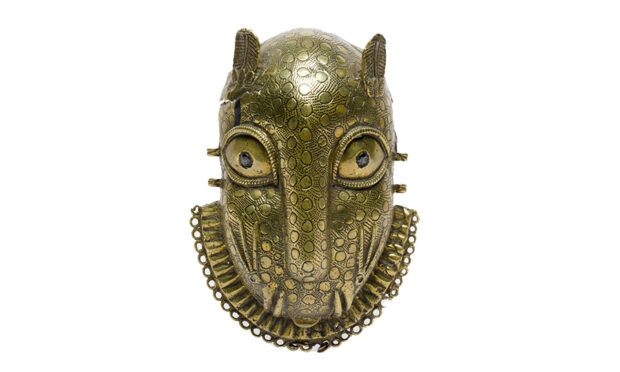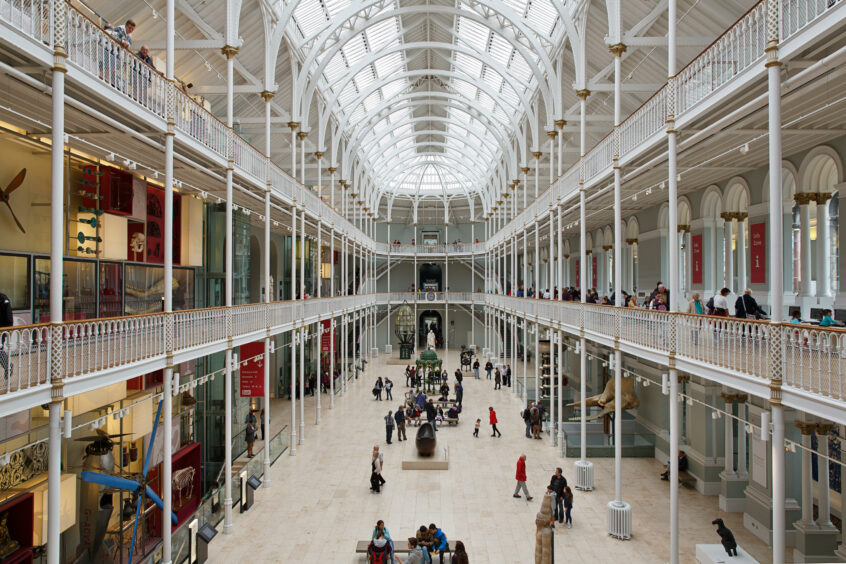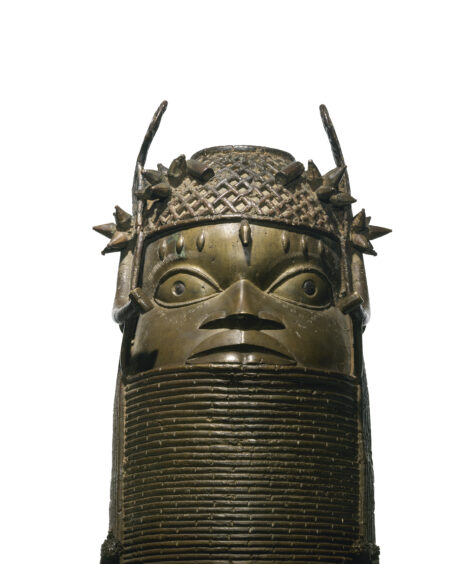
The trustees of Scotland’s national museum will meet within months to discuss returning treasures looted from Africa by British soldiers in 1897.
We can reveal Nigeria has written to National Museums Scotland (NMS) to request the return of famous Benin Bronzes prompting the museums to promise to “weigh the balance” between repatriating or keeping the collection.
Anti-racism campaigners and experts in stolen art have urged NMS to follow the example of other institutions in Scotland and around the world and hand back the artefacts.
Around 5,000 elaborate brass and bronze plaques and carved ivory tusks were looted from the Nigerian city of Benin during a British military expedition. They were stolen in the burning and ransacking of the royal palace and sold to museums and private collectors around the world.
NMS, which has 12 million items in its collections, has 74 Benin Bronzes but only 14 are on display in Edinburgh and one is on loan to the National War Museum. Dr Emiline Smith, lecturer in art crime and criminology at the Scottish Centre for Crime and Justice Research at Glasgow University, said: “Throughout the UK, museums have come under pressure to return the looted objects in their collections. The conversation around the Benin Bronzes has been instrumental in creating this momentum.
“Many museums across the UK have made the ethical choice to return Benin Bronzes to their communities of origin, and National Museums Scotland should follow suit without delay.
“Access, agency and ownership over the Benin Bronzes need to be reinstated to their communities of origin as soon as possible. Delaying this return only prolongs the intergenerational injustices that colonial violence and exploitation has caused.
“Prioritising the needs of current owners over communities of origin – for example, with regards to the timing and format of the return of Benin Bronzes and associated intellectual property – similarly means a continuation of these injustices.”
Of the 74 Benin Bronzes in the NMS collection, 36 were purchased between 1898 and 1903 from art dealer William D Webster. According to the NMS website, others were purchased by or donated to the museum “including from individuals connected to expedition members, who may have been given looted objects in return for their part in the raid”.
Emails obtained by The Sunday Post reveal Nigeria’s National Commission for Museums and Monuments and the Oba, or king, of Benin asked in September for the bronzes in NMS’s collection to be returned.
The National Commission said some of the items would be “hosted in museums to teach youths their history so that they may have pride in their nation”. The museum replied in November that the request and an expert evaluation would be presented to its board of trustees.
“The request and evidence will be brought to the board of trustees for rigorous evaluation and decision, taking into consideration any justifications put forward by the claimants for the permanent transfer of objects and weighing the balance of the case for retention against that for transfer,” said the letter, obtained under freedom of information legislation. “We hope to bring the request and evidence to the board of trustees in spring 2023.”
Last summer, a Scottish Government-sponsored project, Empire, Slavery And Scotland’s Museums, made a series of recommendations on how to address the country’s role in colonialism and slavery.
One of its recommendations was that the Scottish Government “should demonstrate their support for restitution and repatriation of looted or unethically acquired items in Scottish collections”.
The project’s steering group is chaired by anti-racism campaigner Sir Geoff Palmer, who became Scotland’s first black professor in 1989.
He said of the Benin Bronzes: “It is well known that many of these items were acquired unethically and the general consensus is that returning them is the moral thing to do.
“Aberdeen University and Glasgow Life have taken positive steps and National Museums Scotland should follow the lead of those institutions. As a descendant of our slavery, my view is there shouldn’t even be a debate about whether they should be handed back.”
Dan Hicks, professor of contemporary archaeology at Oxford University, has listed 45 museums around the UK thought to have Benin Bronzes in their possession.
He previously told The Sunday Post that the items should be restituted in the same way as art stolen by the Nazis from Holocaust victims, or human remains. “There is no logical reason why the same processes can’t happen for African cultural heritage,” he said.
According to the NMS collections policy, there is a “presumption against the direct, permanent transfer of objects from its collection” but requests “will be considered on a case-by-case basis”.
If granted, final approval would be needed from Scottish Culture Secretary Angus Robertson.
NMS last month announced it was returning to Canada a 33ft totem pole that had been in its collection since 1930. The decision was made after a visit to Edinburgh in August by a delegation of the Nisga’a tribe. It is a member of the Benin Dialogue Group, made up of museum professionals focused on bringing together the artefacts in a planned new museum in Benin City.
NMS said: “In June, we hosted a visit from the National Commission of Museums and Monuments of Nigeria, as part of our ongoing dialogue around the Benin collection.
“We shared information on the objects and discussed our transfer procedure and opportunities for partnership projects. We have received a formal request for the transfer of the objects.
“This will now be considered in line with our published procedure which sets out how, within our legislative framework, we consider requests for the transfer of objects to their country or location of origin on a case-by-case basis.”
Aberdeen University became the first British institution to agree to return a Benin Bronze, which was presented in a handover ceremony attended by Prince Aghatise Erediauwa, the younger brother of the current Benin monarch, in October 2021.
Neil Curtis, the university’s head of museums and special collections, said it had been acquired in a way “that we now consider extremely immoral”.
The 18th Century sculpture was bought by the university at an auction in 1957 for £750 and is now valued at £500,000. The return of a sculpture depicting the head of an Oba, or king, was agreed by the university in March 2021.
However, emails reveal tensions in arrangements about the handover. On March 23 that year, the Nigerian government objected to the return being described as a “long-term loan” in a draft release by the university.
“There is not going to be any kind of loan as the Nigerian nation is never going to take a loan of any of her cultural objects,” emailed an official.
Less than 90 minutes later, a member of the university’s directorate of digital and information services replied: “I agree – long-term loan would not be right. I am therefore pleased that the University of Aberdeen is transferring ownership without any conditions unlike the proposals by some other museums.”
Neil Curtis said yesterday: “The mention of long-term loan only arose because that had been suggested by other museums, not by the University of Aberdeen, which was always committed to a full repatriation.
“The university contacted the Nigerian Government and the Court of the Oba in 2020 with the proposal that the ownership of the Benin Bronze in its collection be transferred to Nigeria with no conditions. It was handed over to Nigerian representatives in October 2021.”
Glasgow Life, which manages museum collections in Scotland’s largest city, is returning 19 Benin Bronzes to Nigeria. An announcement was made in April last year, followed by a visit in June by a delegation from Nigeria’s National Commission for Museums and Monuments to Kelvingrove Art Gallery and Museum to discuss the repatriation of the objects.
Glasgow Life said: “Repatriation of objects is complex because of the age and importance of the items. We are working with NCMM on the process and the date for repatriation which would then go to Glasgow City Council for its agreement.”
The British Museum has been urged to return the 900 Benin Bronzes in its collection but has so far resisted calls, arguing it is prevented from doing so by the British Museum Act of 1963 and the Heritage Act of 1983.
Glasgow North East MP Anne McLaughlin, a member of Westminster’s all-party parliamentary group for Afrikan reparations, said: “Nigeria has its own museums to house its own artefacts.
“Given that Glasgow and Aberdeen have already done the right thing, I am confident National Museums Scotland will follow suit.”
Indiana Jones no more as collections decolonise
The thousands of sculptures known collectively as the Benin Bronzes are only some of the treasures plundered by Western nations during the days of colony that are slowly being returned, writes Mark Aitken.
Museums around the world are beginning to “decolonise” their collections as a headline in the New York Times last month suggested “the Indiana Jones era is over”. Germany last year signed a declaration with Nigeria to release more than 1,100 Benin Bronzes in its public museums and, two weeks ago, German foreign minister Annalena Baerbock personally handed back 20 on a trip to Nigeria.
Cambridge University last month pledged to return its 116 Benin Bronzes and London’s Horniman Museum and Gardens, a private charity, has also signed over its collection looted from Nigeria. The returns increase pressure on the British Museum in London, which has the world’s largest collection of Benin Bronzes with more than 900 objects.
It argues it is legally prevented from returning them under UK laws. But last month it was revealed former Chancellor of the Exchequer George Osborne, chair of the British Museum, has been holding secret talks with the Greek prime minister over the possible return of the Elgin Marbles.
But not everyone agrees of the repatriation of the artefacts to Nigeria. It has also prompted a row with the descendants of slaves.
The Smithsonian Museum of African Art in Washington DC transferred ownership of 29 Benin Bronzes in its collection to Nigeria in October, with another remaining on loan to the museum.
Another 20 are with the Smithsonian’s Museum of National History, and in November the New York-based Restitution Study Group filed a lawsuit to stop their return.
They claimed it would deny the descendants of slaves in America the opportunity to experience their culture and history. According to the group, more than 103,000 slaves were brought to America from ports controlled by traders from Benin.

Enjoy the convenience of having The Sunday Post delivered as a digital ePaper straight to your smartphone, tablet or computer.
Subscribe for only £5.49 a month and enjoy all the benefits of the printed paper as a digital replica.
Subscribe © Alamy Stock Photo
© Alamy Stock Photo